Proposal: Perceived Stress, Rumination, Mindfulness, and I-D Theory
VerifiedAdded on 2022/08/31
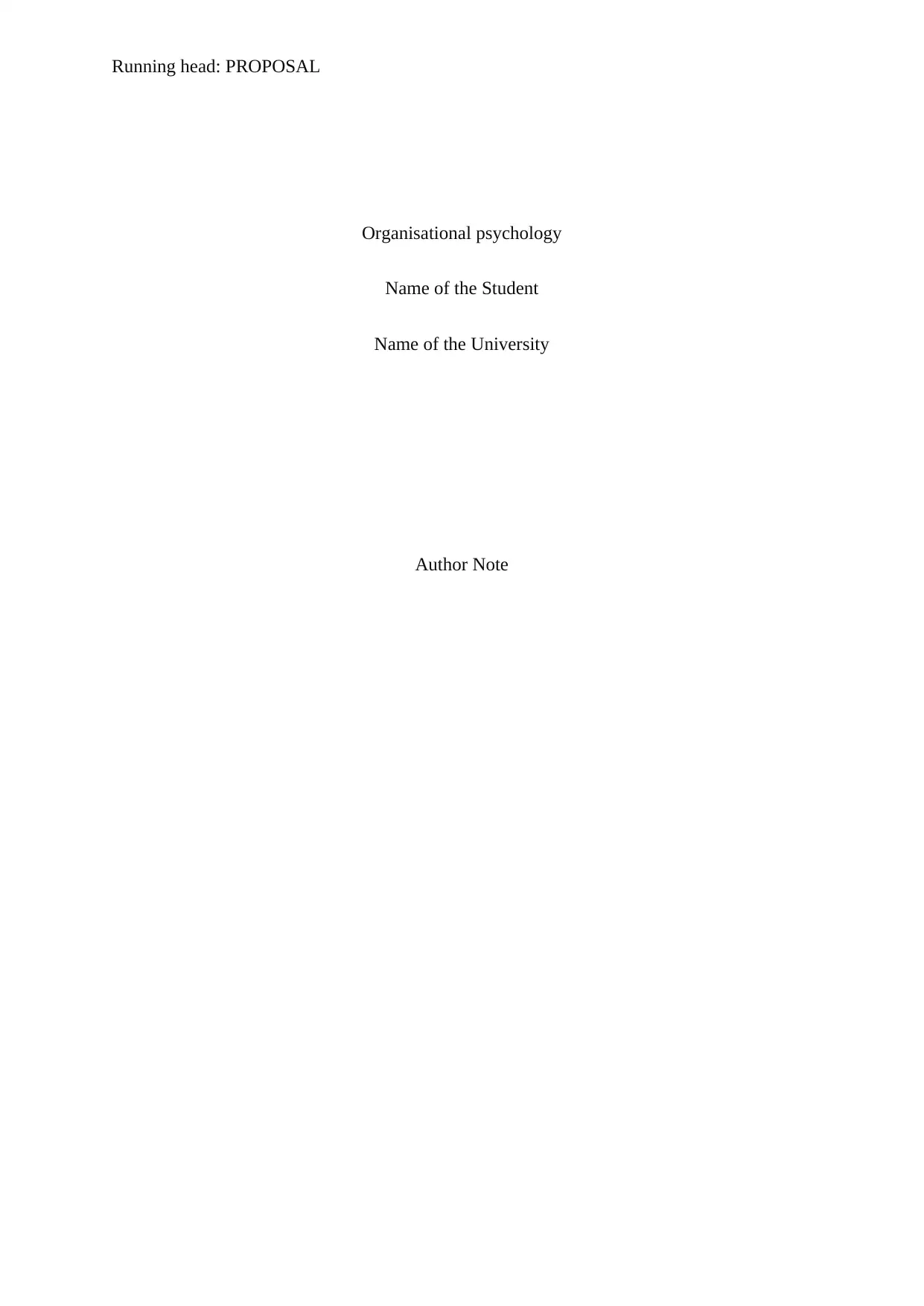
Organisational psychology
Name of the Student
Name of the University
Author Note
Paraphrase This Document
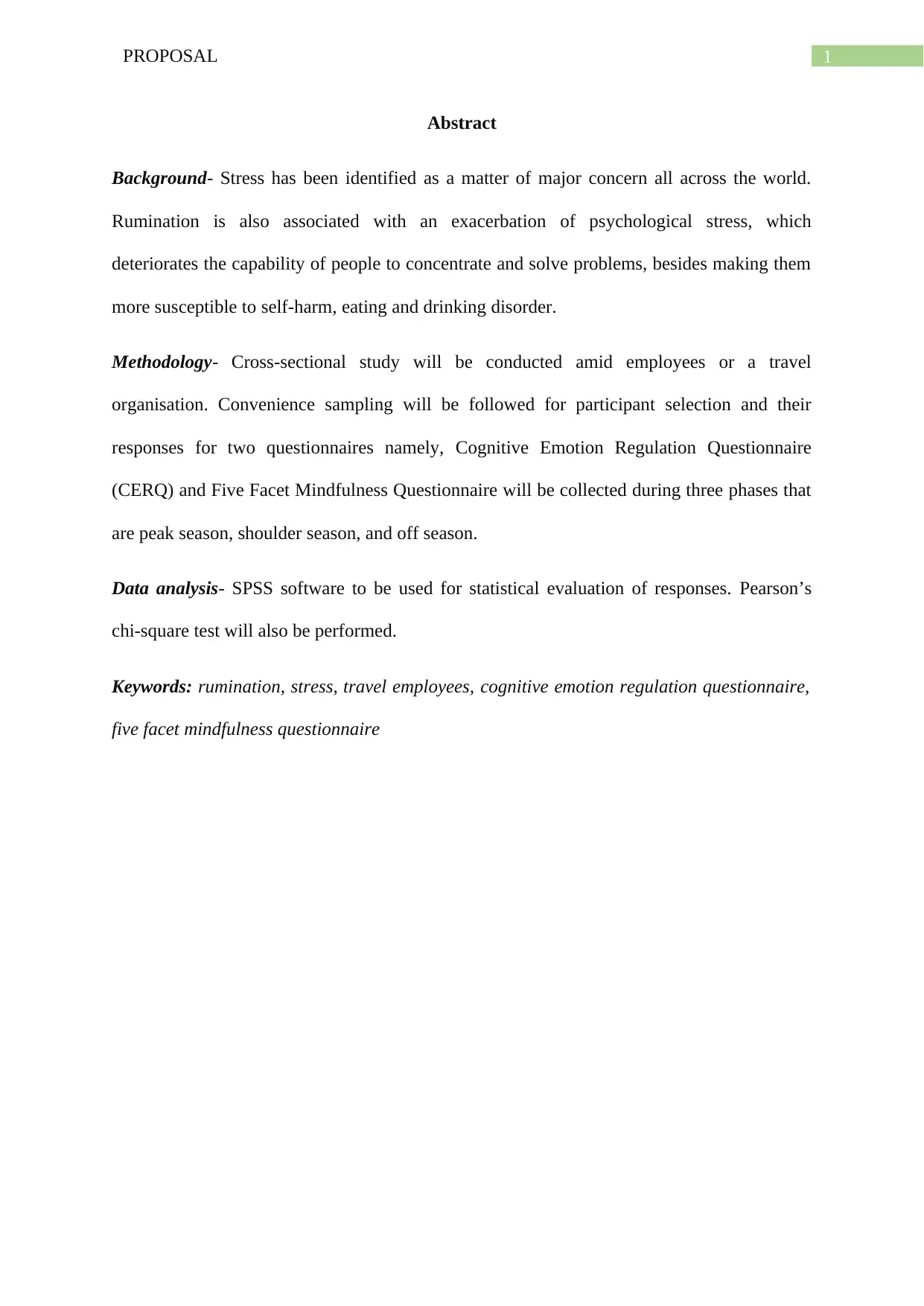
Abstract
Background- Stress has been identified as a matter of major concern all across the world.
Rumination is also associated with an exacerbation of psychological stress, which
deteriorates the capability of people to concentrate and solve problems, besides making them
more susceptible to self-harm, eating and drinking disorder.
Methodology- Cross-sectional study will be conducted amid employees or a travel
organisation. Convenience sampling will be followed for participant selection and their
responses for two questionnaires namely, Cognitive Emotion Regulation Questionnaire
(CERQ) and Five Facet Mindfulness Questionnaire will be collected during three phases that
are peak season, shoulder season, and off season.
Data analysis- SPSS software to be used for statistical evaluation of responses. Pearson’s
chi-square test will also be performed.
Keywords: rumination, stress, travel employees, cognitive emotion regulation questionnaire,
five facet mindfulness questionnaire
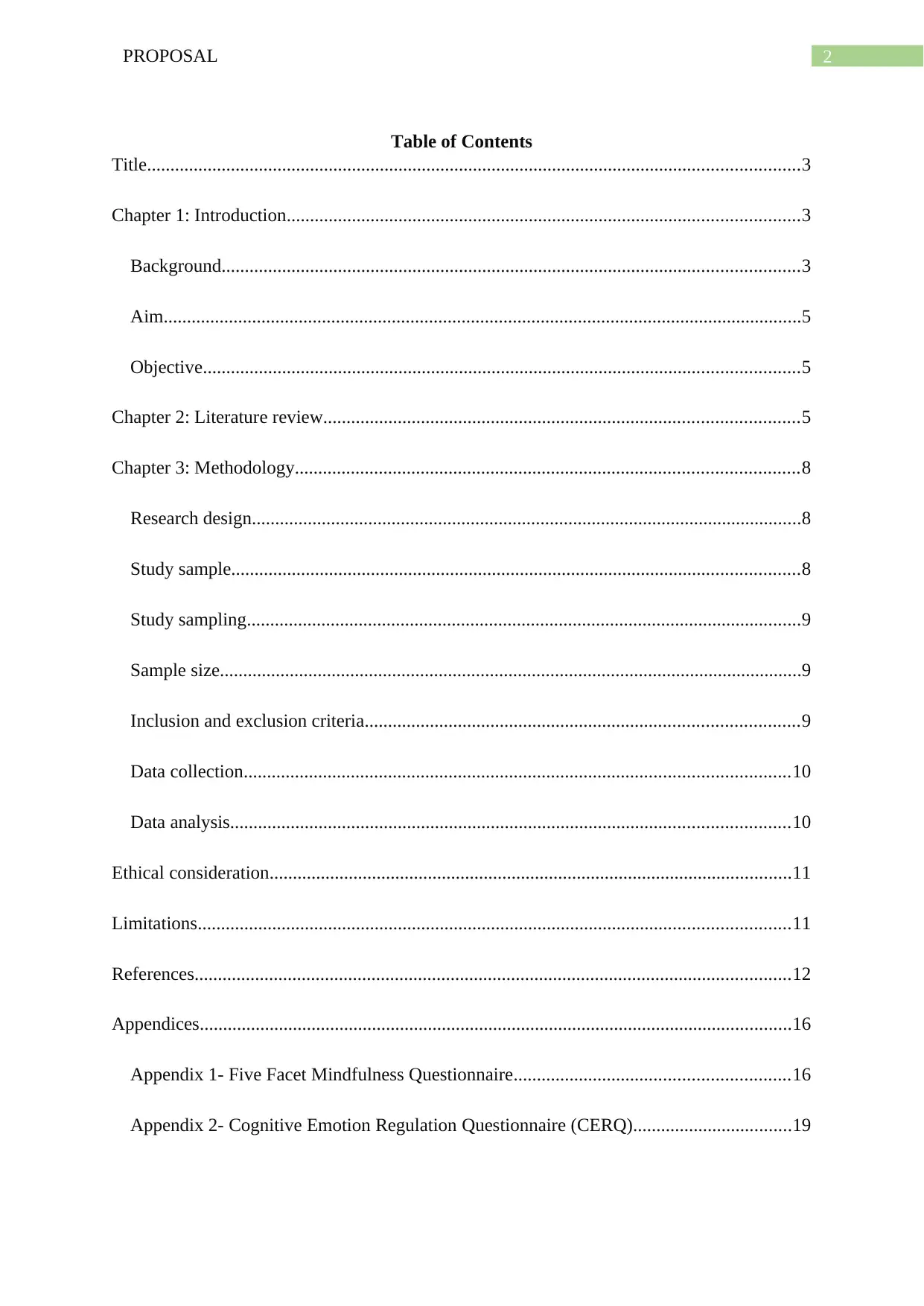
Table of Contents
Title............................................................................................................................................3
Chapter 1: Introduction..............................................................................................................3
Background............................................................................................................................3
Aim.........................................................................................................................................5
Objective................................................................................................................................5
Chapter 2: Literature review......................................................................................................5
Chapter 3: Methodology............................................................................................................8
Research design......................................................................................................................8
Study sample..........................................................................................................................8
Study sampling.......................................................................................................................9
Sample size.............................................................................................................................9
Inclusion and exclusion criteria.............................................................................................9
Data collection.....................................................................................................................10
Data analysis........................................................................................................................10
Ethical consideration................................................................................................................11
Limitations...............................................................................................................................11
References................................................................................................................................12
Appendices...............................................................................................................................16
Appendix 1- Five Facet Mindfulness Questionnaire...........................................................16
Appendix 2- Cognitive Emotion Regulation Questionnaire (CERQ)..................................19
⊘ This is a preview!⊘
Do you want full access?
Subscribe today to unlock all pages.

Trusted by 1+ million students worldwide
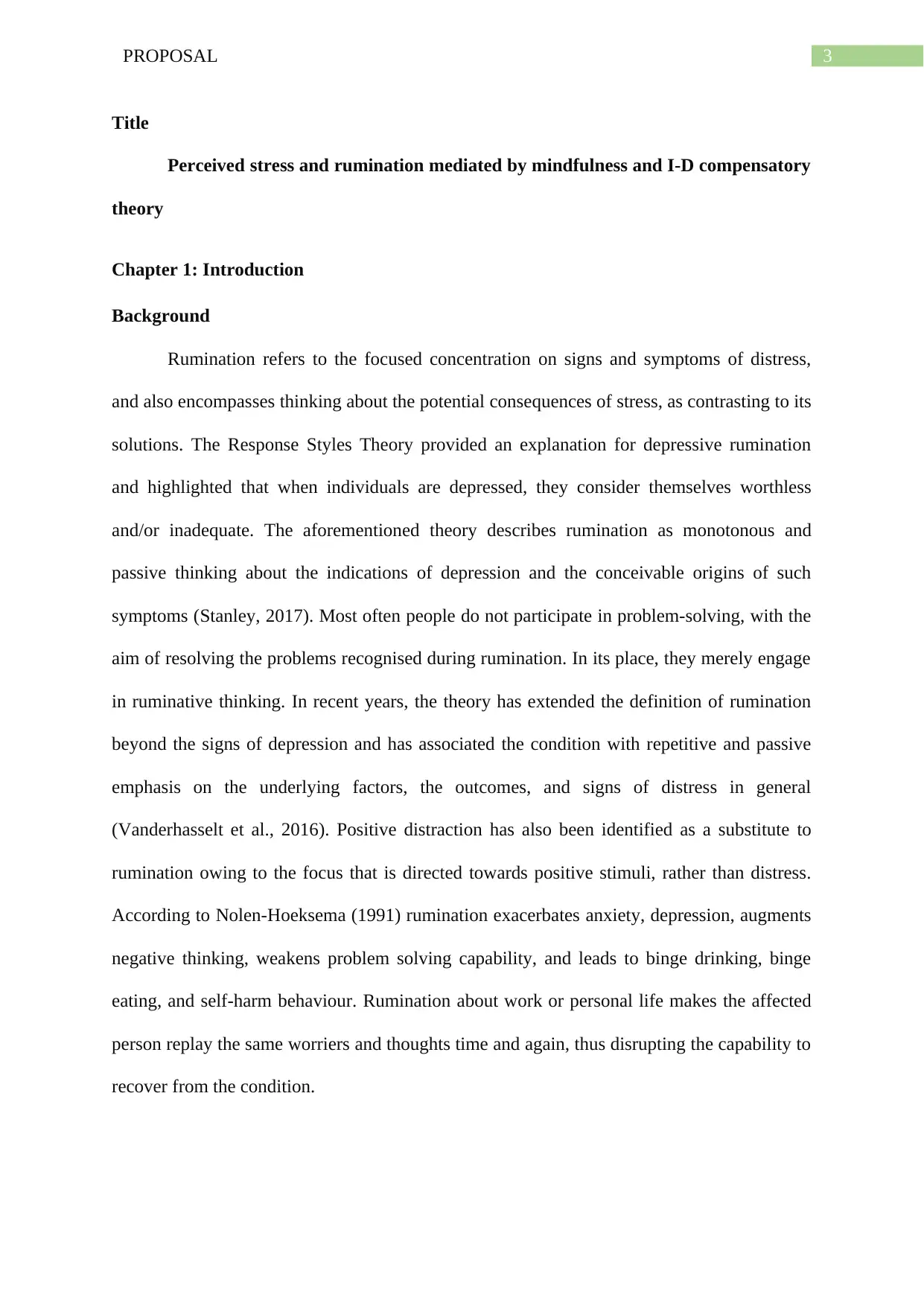
Title
Perceived stress and rumination mediated by mindfulness and I-D compensatory
theory
Chapter 1: Introduction
Background
Rumination refers to the focused concentration on signs and symptoms of distress,
and also encompasses thinking about the potential consequences of stress, as contrasting to its
solutions. The Response Styles Theory provided an explanation for depressive rumination
and highlighted that when individuals are depressed, they consider themselves worthless
and/or inadequate. The aforementioned theory describes rumination as monotonous and
passive thinking about the indications of depression and the conceivable origins of such
symptoms (Stanley, 2017). Most often people do not participate in problem-solving, with the
aim of resolving the problems recognised during rumination. In its place, they merely engage
in ruminative thinking. In recent years, the theory has extended the definition of rumination
beyond the signs of depression and has associated the condition with repetitive and passive
emphasis on the underlying factors, the outcomes, and signs of distress in general
(Vanderhasselt et al., 2016). Positive distraction has also been identified as a substitute to
rumination owing to the focus that is directed towards positive stimuli, rather than distress.
According to Nolen-Hoeksema (1991) rumination exacerbates anxiety, depression, augments
negative thinking, weakens problem solving capability, and leads to binge drinking, binge
eating, and self-harm behaviour. Rumination about work or personal life makes the affected
person replay the same worriers and thoughts time and again, thus disrupting the capability to
recover from the condition.
Paraphrase This Document
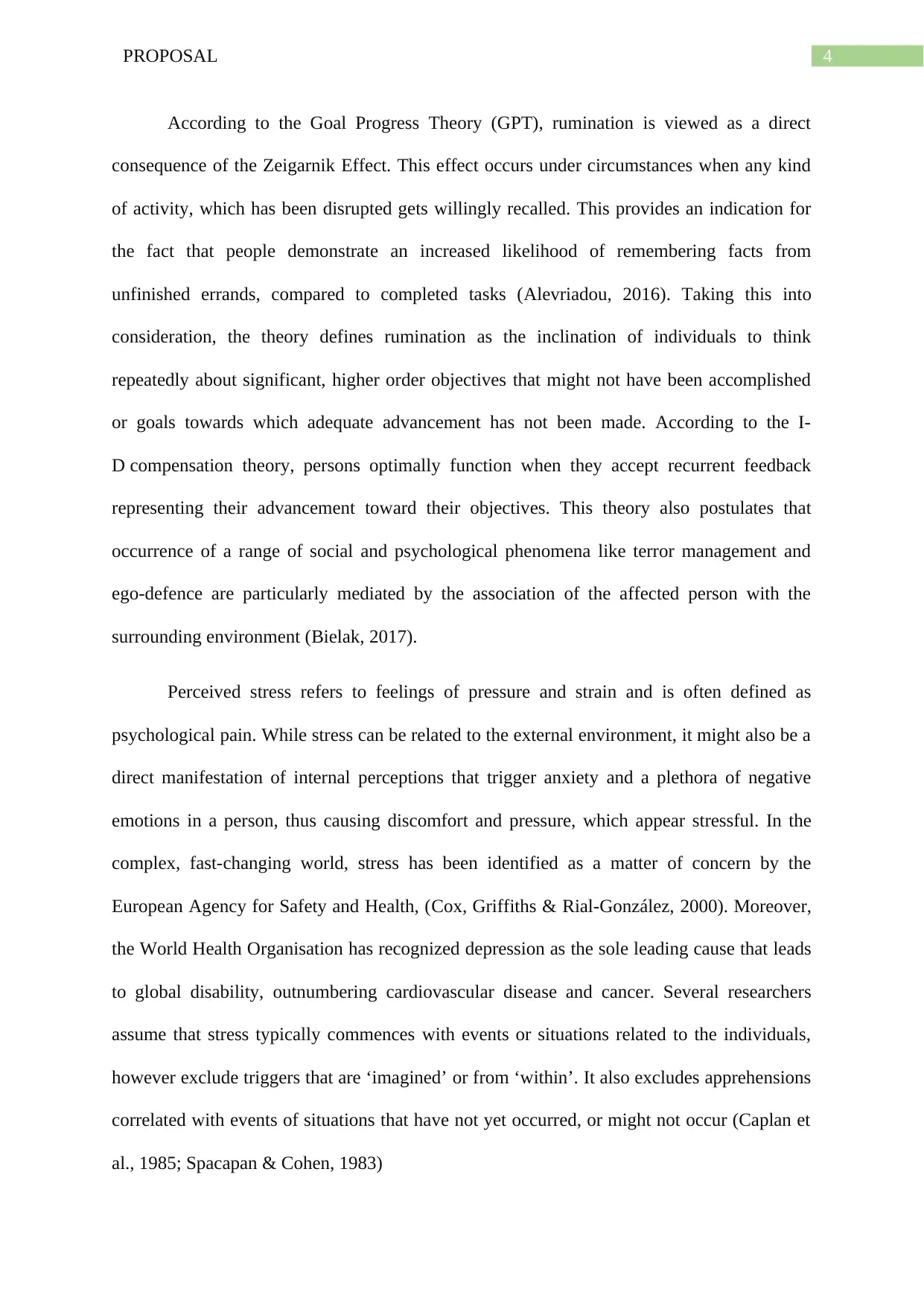
According to the Goal Progress Theory (GPT), rumination is viewed as a direct
consequence of the Zeigarnik Effect. This effect occurs under circumstances when any kind
of activity, which has been disrupted gets willingly recalled. This provides an indication for
the fact that people demonstrate an increased likelihood of remembering facts from
unfinished errands, compared to completed tasks (Alevriadou, 2016). Taking this into
consideration, the theory defines rumination as the inclination of individuals to think
repeatedly about significant, higher order objectives that might not have been accomplished
or goals towards which adequate advancement has not been made. According to the I-
D compensation theory, persons optimally function when they accept recurrent feedback
representing their advancement toward their objectives. This theory also postulates that
occurrence of a range of social and psychological phenomena like terror management and
ego-defence are particularly mediated by the association of the affected person with the
surrounding environment (Bielak, 2017).
Perceived stress refers to feelings of pressure and strain and is often defined as
psychological pain. While stress can be related to the external environment, it might also be a
direct manifestation of internal perceptions that trigger anxiety and a plethora of negative
emotions in a person, thus causing discomfort and pressure, which appear stressful. In the
complex, fast-changing world, stress has been identified as a matter of concern by the
European Agency for Safety and Health, (Cox, Griffiths & Rial-González, 2000). Moreover,
the World Health Organisation has recognized depression as the sole leading cause that leads
to global disability, outnumbering cardiovascular disease and cancer. Several researchers
assume that stress typically commences with events or situations related to the individuals,
however exclude triggers that are ‘imagined’ or from ‘within’. It also excludes apprehensions
correlated with events of situations that have not yet occurred, or might not occur (Caplan et
al., 1985; Spacapan & Cohen, 1983)
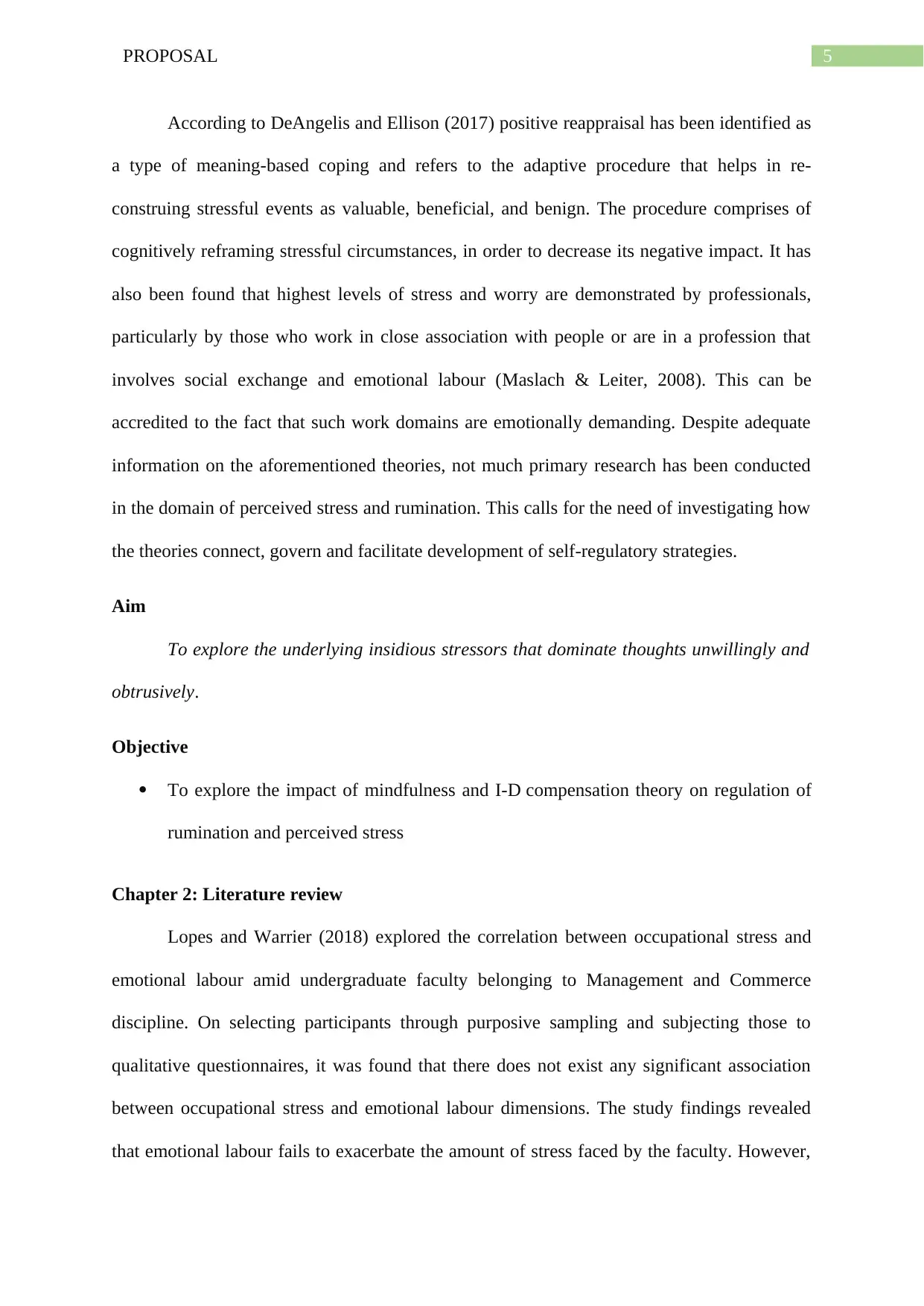
According to DeAngelis and Ellison (2017) positive reappraisal has been identified as
a type of meaning-based coping and refers to the adaptive procedure that helps in re-
construing stressful events as valuable, beneficial, and benign. The procedure comprises of
cognitively reframing stressful circumstances, in order to decrease its negative impact. It has
also been found that highest levels of stress and worry are demonstrated by professionals,
particularly by those who work in close association with people or are in a profession that
involves social exchange and emotional labour (Maslach & Leiter, 2008). This can be
accredited to the fact that such work domains are emotionally demanding. Despite adequate
information on the aforementioned theories, not much primary research has been conducted
in the domain of perceived stress and rumination. This calls for the need of investigating how
the theories connect, govern and facilitate development of self-regulatory strategies.
Aim
To explore the underlying insidious stressors that dominate thoughts unwillingly and
obtrusively.
Objective
To explore the impact of mindfulness and I-D compensation theory on regulation of
rumination and perceived stress
Chapter 2: Literature review
Lopes and Warrier (2018) explored the correlation between occupational stress and
emotional labour amid undergraduate faculty belonging to Management and Commerce
discipline. On selecting participants through purposive sampling and subjecting those to
qualitative questionnaires, it was found that there does not exist any significant association
between occupational stress and emotional labour dimensions. The study findings revealed
that emotional labour fails to exacerbate the amount of stress faced by the faculty. However,
⊘ This is a preview!⊘
Do you want full access?
Subscribe today to unlock all pages.

Trusted by 1+ million students worldwide
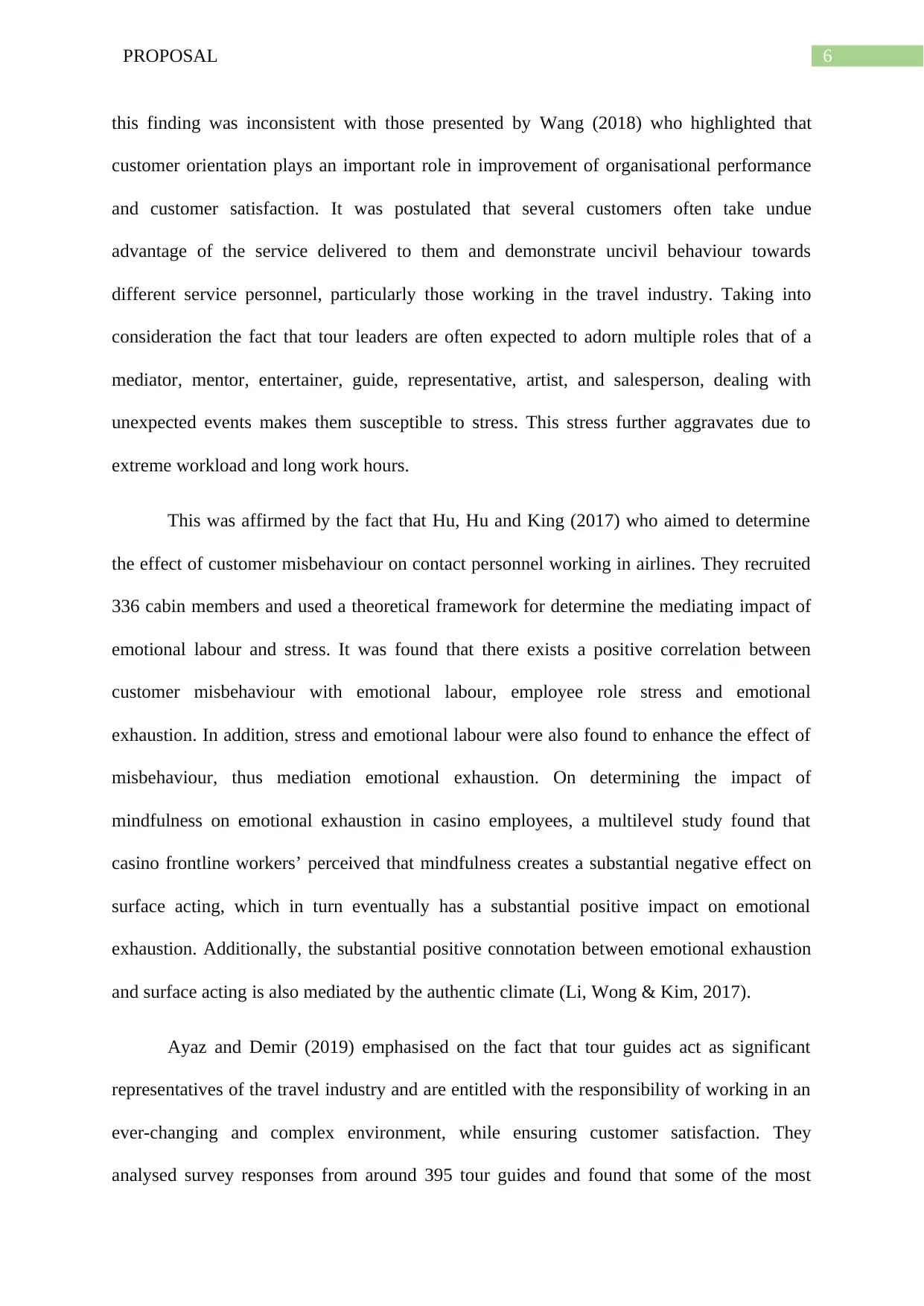
this finding was inconsistent with those presented by Wang (2018) who highlighted that
customer orientation plays an important role in improvement of organisational performance
and customer satisfaction. It was postulated that several customers often take undue
advantage of the service delivered to them and demonstrate uncivil behaviour towards
different service personnel, particularly those working in the travel industry. Taking into
consideration the fact that tour leaders are often expected to adorn multiple roles that of a
mediator, mentor, entertainer, guide, representative, artist, and salesperson, dealing with
unexpected events makes them susceptible to stress. This stress further aggravates due to
extreme workload and long work hours.
This was affirmed by the fact that Hu, Hu and King (2017) who aimed to determine
the effect of customer misbehaviour on contact personnel working in airlines. They recruited
336 cabin members and used a theoretical framework for determine the mediating impact of
emotional labour and stress. It was found that there exists a positive correlation between
customer misbehaviour with emotional labour, employee role stress and emotional
exhaustion. In addition, stress and emotional labour were also found to enhance the effect of
misbehaviour, thus mediation emotional exhaustion. On determining the impact of
mindfulness on emotional exhaustion in casino employees, a multilevel study found that
casino frontline workers’ perceived that mindfulness creates a substantial negative effect on
surface acting, which in turn eventually has a substantial positive impact on emotional
exhaustion. Additionally, the substantial positive connotation between emotional exhaustion
and surface acting is also mediated by the authentic climate (Li, Wong & Kim, 2017).
Ayaz and Demir (2019) emphasised on the fact that tour guides act as significant
representatives of the travel industry and are entitled with the responsibility of working in an
ever-changing and complex environment, while ensuring customer satisfaction. They
analysed survey responses from around 395 tour guides and found that some of the most
Paraphrase This Document
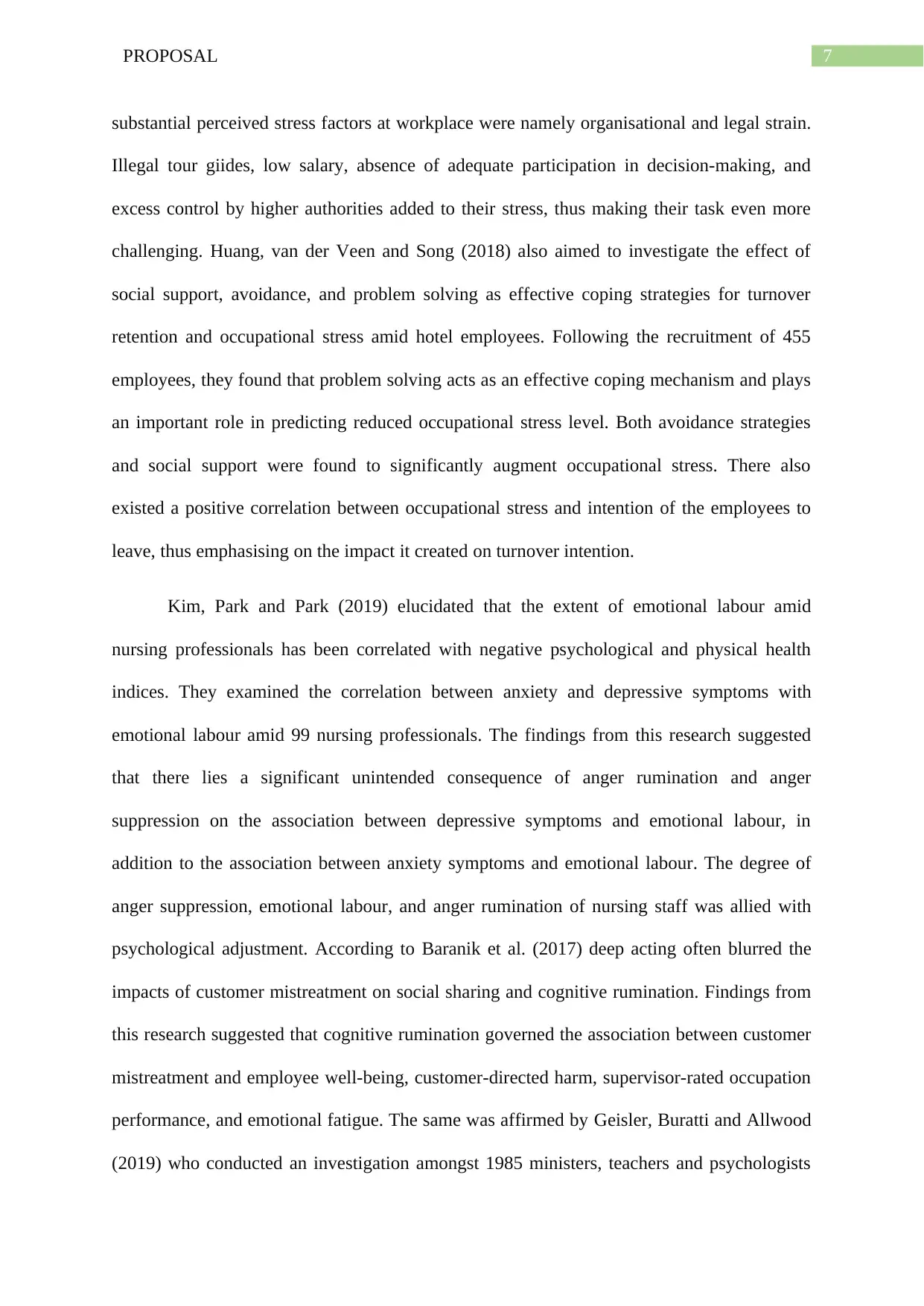
substantial perceived stress factors at workplace were namely organisational and legal strain.
Illegal tour giides, low salary, absence of adequate participation in decision-making, and
excess control by higher authorities added to their stress, thus making their task even more
challenging. Huang, van der Veen and Song (2018) also aimed to investigate the effect of
social support, avoidance, and problem solving as effective coping strategies for turnover
retention and occupational stress amid hotel employees. Following the recruitment of 455
employees, they found that problem solving acts as an effective coping mechanism and plays
an important role in predicting reduced occupational stress level. Both avoidance strategies
and social support were found to significantly augment occupational stress. There also
existed a positive correlation between occupational stress and intention of the employees to
leave, thus emphasising on the impact it created on turnover intention.
Kim, Park and Park (2019) elucidated that the extent of emotional labour amid
nursing professionals has been correlated with negative psychological and physical health
indices. They examined the correlation between anxiety and depressive symptoms with
emotional labour amid 99 nursing professionals. The findings from this research suggested
that there lies a significant unintended consequence of anger rumination and anger
suppression on the association between depressive symptoms and emotional labour, in
addition to the association between anxiety symptoms and emotional labour. The degree of
anger suppression, emotional labour, and anger rumination of nursing staff was allied with
psychological adjustment. According to Baranik et al. (2017) deep acting often blurred the
impacts of customer mistreatment on social sharing and cognitive rumination. Findings from
this research suggested that cognitive rumination governed the association between customer
mistreatment and employee well-being, customer-directed harm, supervisor-rated occupation
performance, and emotional fatigue. The same was affirmed by Geisler, Buratti and Allwood
(2019) who conducted an investigation amongst 1985 ministers, teachers and psychologists
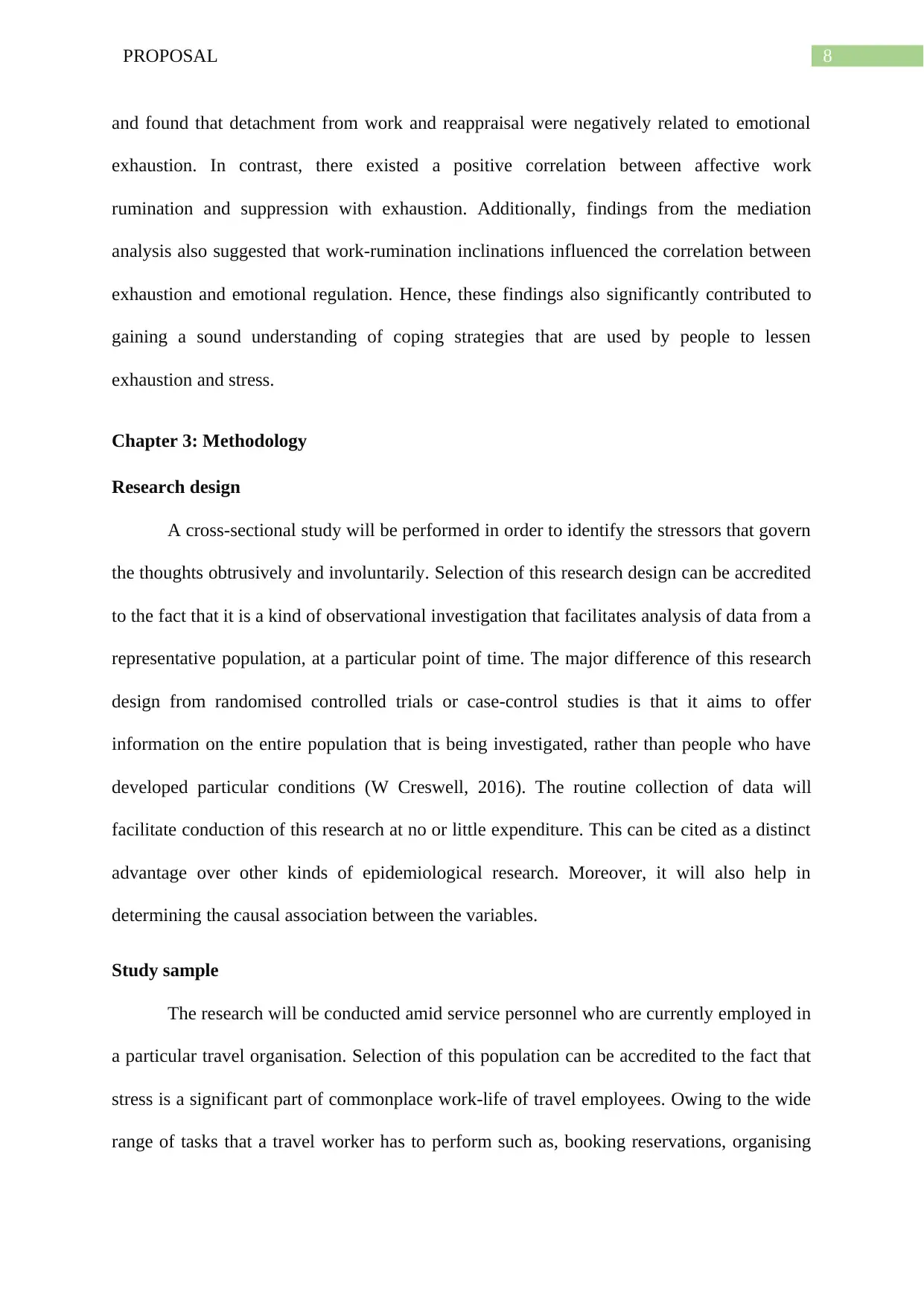
and found that detachment from work and reappraisal were negatively related to emotional
exhaustion. In contrast, there existed a positive correlation between affective work
rumination and suppression with exhaustion. Additionally, findings from the mediation
analysis also suggested that work-rumination inclinations influenced the correlation between
exhaustion and emotional regulation. Hence, these findings also significantly contributed to
gaining a sound understanding of coping strategies that are used by people to lessen
exhaustion and stress.
Chapter 3: Methodology
Research design
A cross-sectional study will be performed in order to identify the stressors that govern
the thoughts obtrusively and involuntarily. Selection of this research design can be accredited
to the fact that it is a kind of observational investigation that facilitates analysis of data from a
representative population, at a particular point of time. The major difference of this research
design from randomised controlled trials or case-control studies is that it aims to offer
information on the entire population that is being investigated, rather than people who have
developed particular conditions (W Creswell, 2016). The routine collection of data will
facilitate conduction of this research at no or little expenditure. This can be cited as a distinct
advantage over other kinds of epidemiological research. Moreover, it will also help in
determining the causal association between the variables.
Study sample
The research will be conducted amid service personnel who are currently employed in
a particular travel organisation. Selection of this population can be accredited to the fact that
stress is a significant part of commonplace work-life of travel employees. Owing to the wide
range of tasks that a travel worker has to perform such as, booking reservations, organising
⊘ This is a preview!⊘
Do you want full access?
Subscribe today to unlock all pages.

Trusted by 1+ million students worldwide
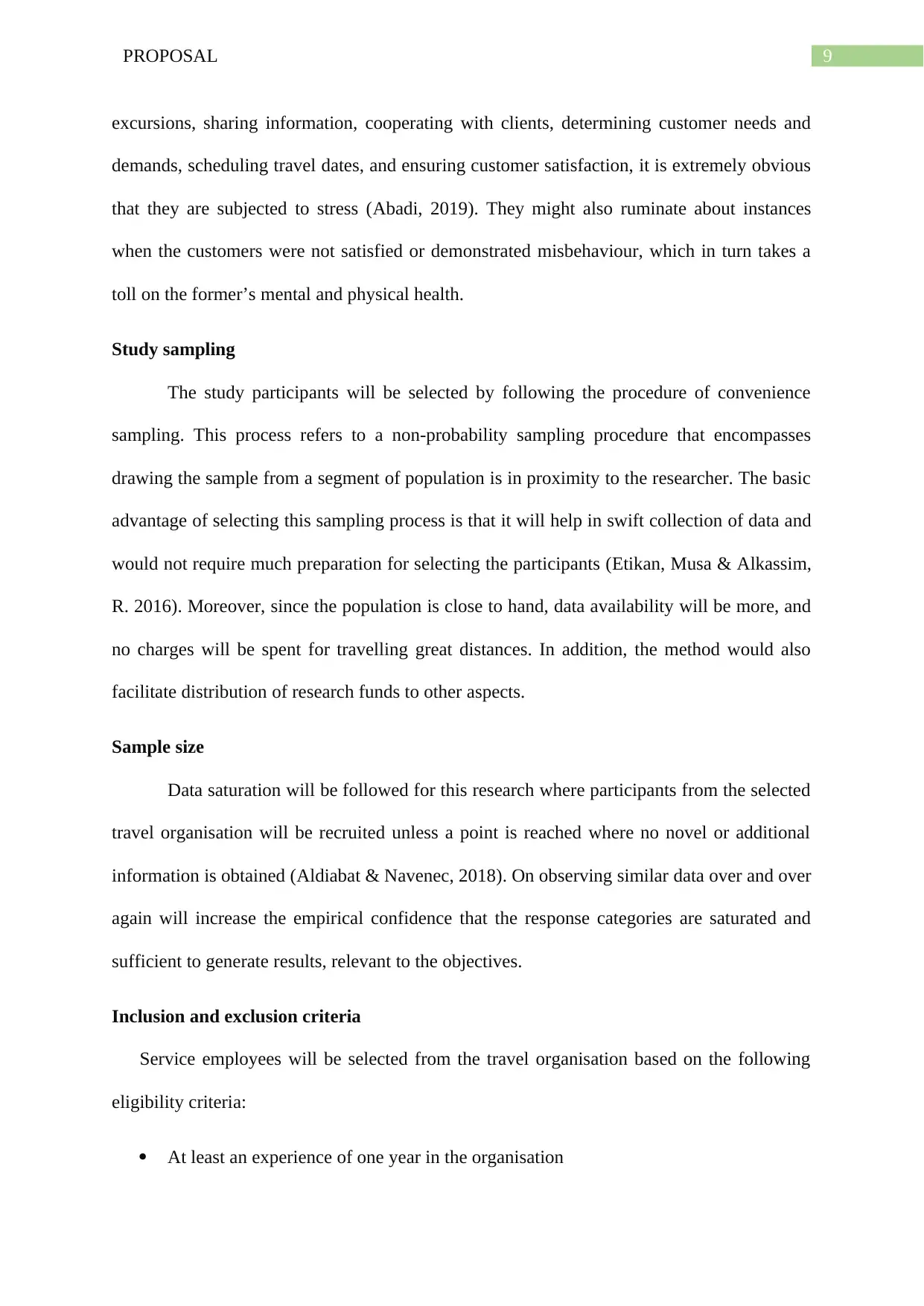
excursions, sharing information, cooperating with clients, determining customer needs and
demands, scheduling travel dates, and ensuring customer satisfaction, it is extremely obvious
that they are subjected to stress (Abadi, 2019). They might also ruminate about instances
when the customers were not satisfied or demonstrated misbehaviour, which in turn takes a
toll on the former’s mental and physical health.
Study sampling
The study participants will be selected by following the procedure of convenience
sampling. This process refers to a non-probability sampling procedure that encompasses
drawing the sample from a segment of population is in proximity to the researcher. The basic
advantage of selecting this sampling process is that it will help in swift collection of data and
would not require much preparation for selecting the participants (Etikan, Musa & Alkassim,
R. 2016). Moreover, since the population is close to hand, data availability will be more, and
no charges will be spent for travelling great distances. In addition, the method would also
facilitate distribution of research funds to other aspects.
Sample size
Data saturation will be followed for this research where participants from the selected
travel organisation will be recruited unless a point is reached where no novel or additional
information is obtained (Aldiabat & Navenec, 2018). On observing similar data over and over
again will increase the empirical confidence that the response categories are saturated and
sufficient to generate results, relevant to the objectives.
Inclusion and exclusion criteria
Service employees will be selected from the travel organisation based on the following
eligibility criteria:
At least an experience of one year in the organisation
Paraphrase This Document
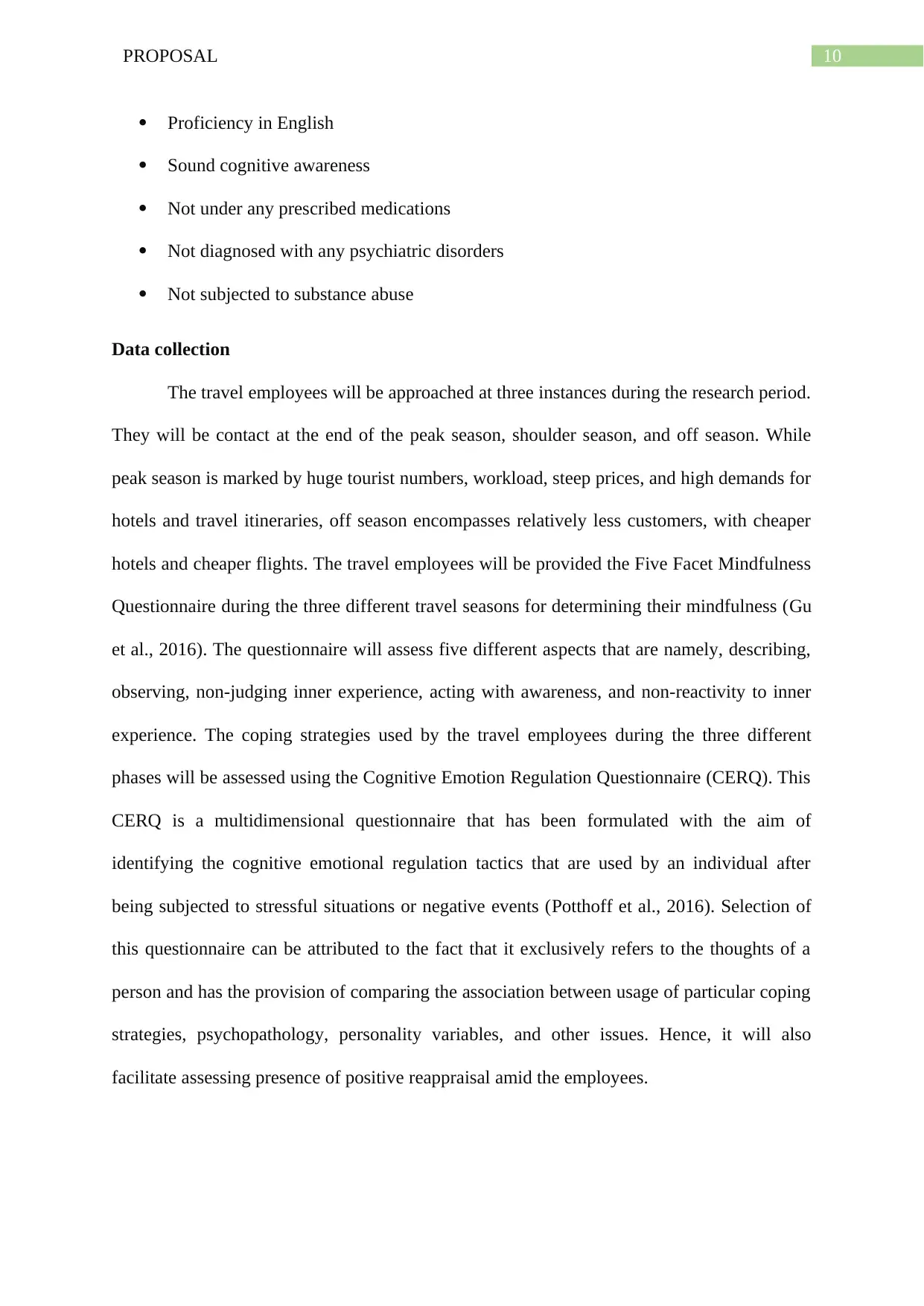
Proficiency in English
Sound cognitive awareness
Not under any prescribed medications
Not diagnosed with any psychiatric disorders
Not subjected to substance abuse
Data collection
The travel employees will be approached at three instances during the research period.
They will be contact at the end of the peak season, shoulder season, and off season. While
peak season is marked by huge tourist numbers, workload, steep prices, and high demands for
hotels and travel itineraries, off season encompasses relatively less customers, with cheaper
hotels and cheaper flights. The travel employees will be provided the Five Facet Mindfulness
Questionnaire during the three different travel seasons for determining their mindfulness (Gu
et al., 2016). The questionnaire will assess five different aspects that are namely, describing,
observing, non-judging inner experience, acting with awareness, and non-reactivity to inner
experience. The coping strategies used by the travel employees during the three different
phases will be assessed using the Cognitive Emotion Regulation Questionnaire (CERQ). This
CERQ is a multidimensional questionnaire that has been formulated with the aim of
identifying the cognitive emotional regulation tactics that are used by an individual after
being subjected to stressful situations or negative events (Potthoff et al., 2016). Selection of
this questionnaire can be attributed to the fact that it exclusively refers to the thoughts of a
person and has the provision of comparing the association between usage of particular coping
strategies, psychopathology, personality variables, and other issues. Hence, it will also
facilitate assessing presence of positive reappraisal amid the employees.
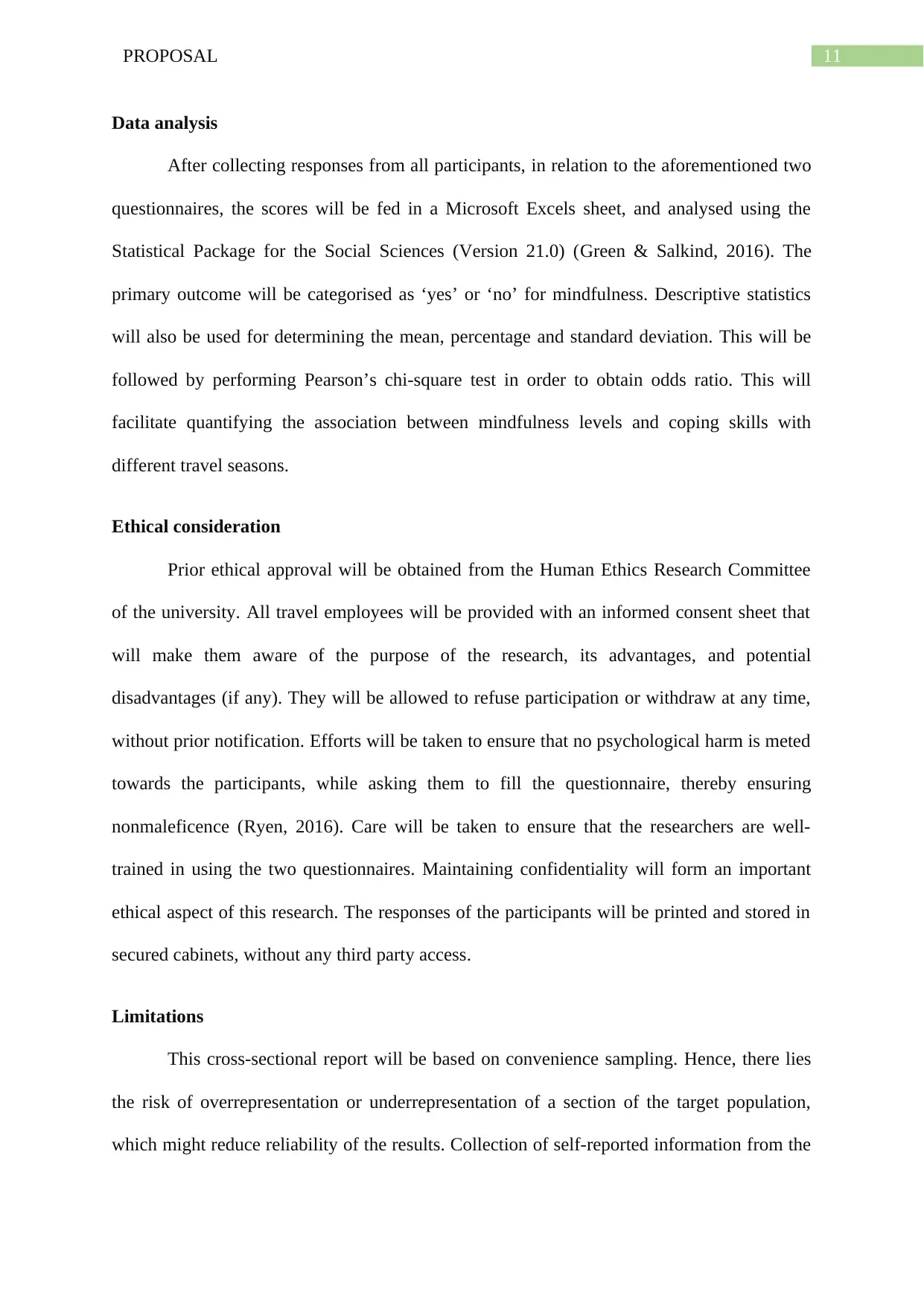
Data analysis
After collecting responses from all participants, in relation to the aforementioned two
questionnaires, the scores will be fed in a Microsoft Excels sheet, and analysed using the
Statistical Package for the Social Sciences (Version 21.0) (Green & Salkind, 2016). The
primary outcome will be categorised as ‘yes’ or ‘no’ for mindfulness. Descriptive statistics
will also be used for determining the mean, percentage and standard deviation. This will be
followed by performing Pearson’s chi-square test in order to obtain odds ratio. This will
facilitate quantifying the association between mindfulness levels and coping skills with
different travel seasons.
Ethical consideration
Prior ethical approval will be obtained from the Human Ethics Research Committee
of the university. All travel employees will be provided with an informed consent sheet that
will make them aware of the purpose of the research, its advantages, and potential
disadvantages (if any). They will be allowed to refuse participation or withdraw at any time,
without prior notification. Efforts will be taken to ensure that no psychological harm is meted
towards the participants, while asking them to fill the questionnaire, thereby ensuring
nonmaleficence (Ryen, 2016). Care will be taken to ensure that the researchers are well-
trained in using the two questionnaires. Maintaining confidentiality will form an important
ethical aspect of this research. The responses of the participants will be printed and stored in
secured cabinets, without any third party access.
Limitations
This cross-sectional report will be based on convenience sampling. Hence, there lies
the risk of overrepresentation or underrepresentation of a section of the target population,
which might reduce reliability of the results. Collection of self-reported information from the
⊘ This is a preview!⊘
Do you want full access?
Subscribe today to unlock all pages.

Trusted by 1+ million students worldwide
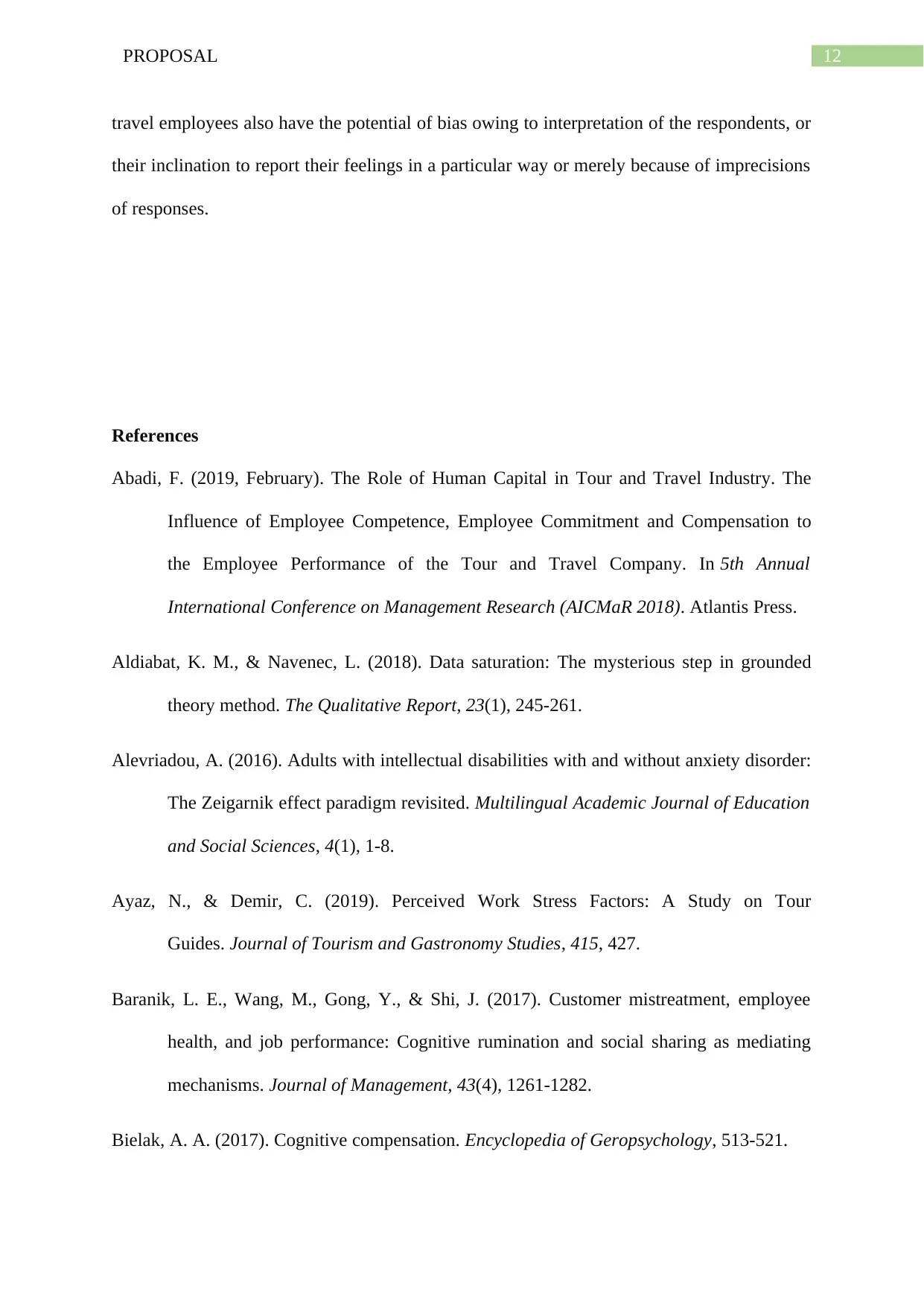
travel employees also have the potential of bias owing to interpretation of the respondents, or
their inclination to report their feelings in a particular way or merely because of imprecisions
of responses.
References
Abadi, F. (2019, February). The Role of Human Capital in Tour and Travel Industry. The
Influence of Employee Competence, Employee Commitment and Compensation to
the Employee Performance of the Tour and Travel Company. In 5th Annual
International Conference on Management Research (AICMaR 2018). Atlantis Press.
Aldiabat, K. M., & Navenec, L. (2018). Data saturation: The mysterious step in grounded
theory method. The Qualitative Report, 23(1), 245-261.
Alevriadou, A. (2016). Adults with intellectual disabilities with and without anxiety disorder:
The Zeigarnik effect paradigm revisited. Multilingual Academic Journal of Education
and Social Sciences, 4(1), 1-8.
Ayaz, N., & Demir, C. (2019). Perceived Work Stress Factors: A Study on Tour
Guides. Journal of Tourism and Gastronomy Studies, 415, 427.
Baranik, L. E., Wang, M., Gong, Y., & Shi, J. (2017). Customer mistreatment, employee
health, and job performance: Cognitive rumination and social sharing as mediating
mechanisms. Journal of Management, 43(4), 1261-1282.
Bielak, A. A. (2017). Cognitive compensation. Encyclopedia of Geropsychology, 513-521.
Paraphrase This Document
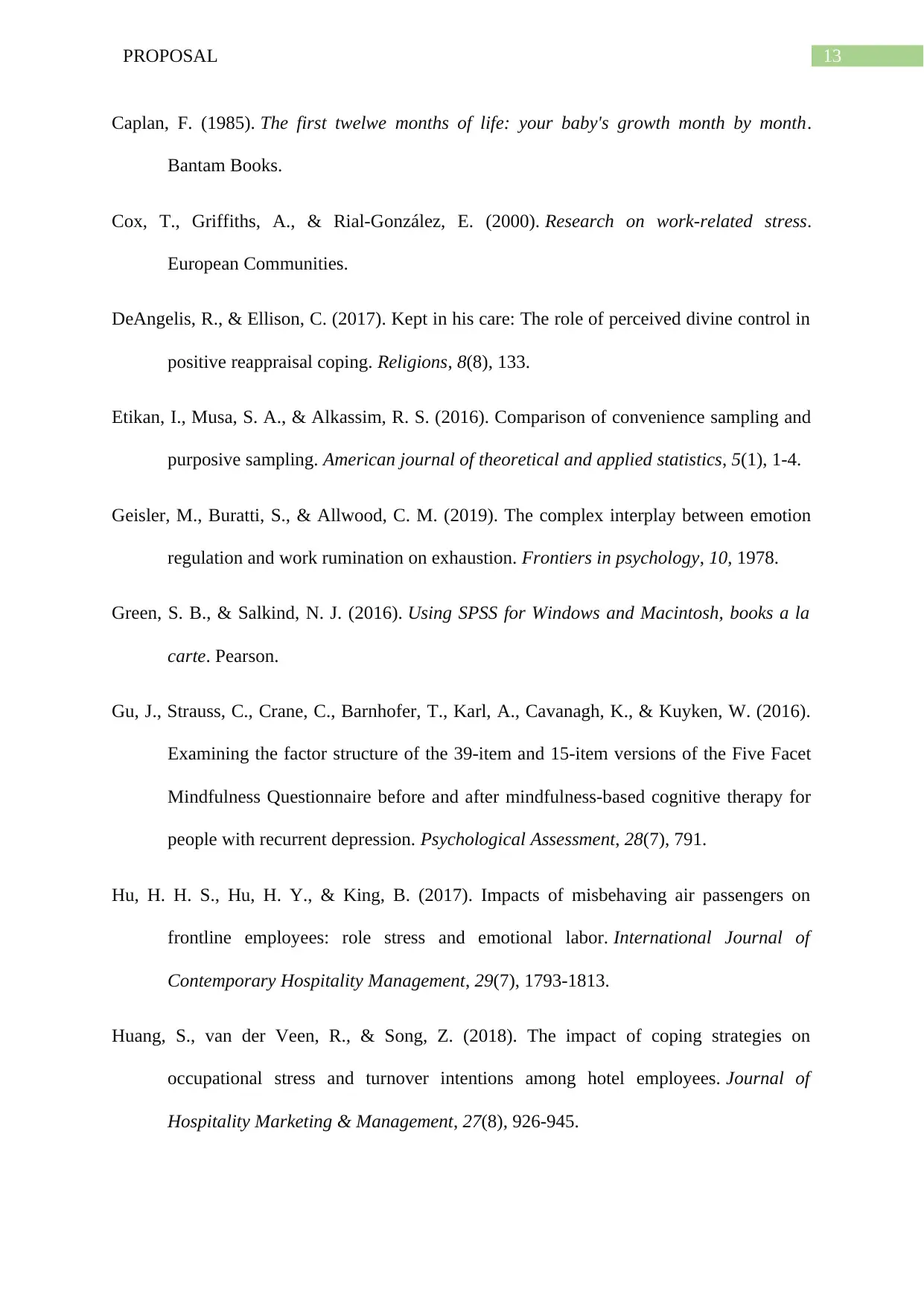
Caplan, F. (1985). The first twelwe months of life: your baby's growth month by month.
Bantam Books.
Cox, T., Griffiths, A., & Rial-González, E. (2000). Research on work-related stress.
European Communities.
DeAngelis, R., & Ellison, C. (2017). Kept in his care: The role of perceived divine control in
positive reappraisal coping. Religions, 8(8), 133.
Etikan, I., Musa, S. A., & Alkassim, R. S. (2016). Comparison of convenience sampling and
purposive sampling. American journal of theoretical and applied statistics, 5(1), 1-4.
Geisler, M., Buratti, S., & Allwood, C. M. (2019). The complex interplay between emotion
regulation and work rumination on exhaustion. Frontiers in psychology, 10, 1978.
Green, S. B., & Salkind, N. J. (2016). Using SPSS for Windows and Macintosh, books a la
carte. Pearson.
Gu, J., Strauss, C., Crane, C., Barnhofer, T., Karl, A., Cavanagh, K., & Kuyken, W. (2016).
Examining the factor structure of the 39-item and 15-item versions of the Five Facet
Mindfulness Questionnaire before and after mindfulness-based cognitive therapy for
people with recurrent depression. Psychological Assessment, 28(7), 791.
Hu, H. H. S., Hu, H. Y., & King, B. (2017). Impacts of misbehaving air passengers on
frontline employees: role stress and emotional labor. International Journal of
Contemporary Hospitality Management, 29(7), 1793-1813.
Huang, S., van der Veen, R., & Song, Z. (2018). The impact of coping strategies on
occupational stress and turnover intentions among hotel employees. Journal of
Hospitality Marketing & Management, 27(8), 926-945.
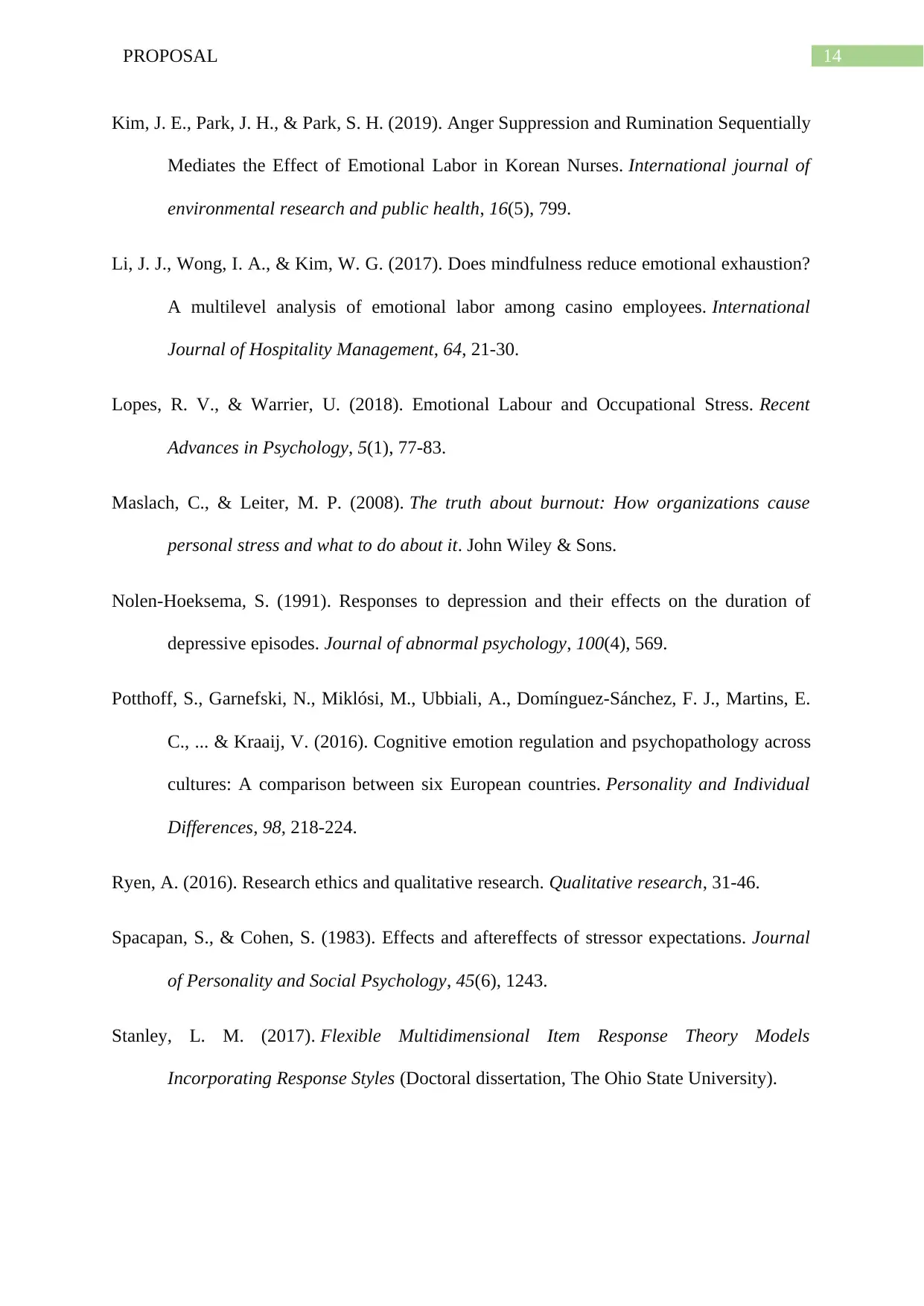
Kim, J. E., Park, J. H., & Park, S. H. (2019). Anger Suppression and Rumination Sequentially
Mediates the Effect of Emotional Labor in Korean Nurses. International journal of
environmental research and public health, 16(5), 799.
Li, J. J., Wong, I. A., & Kim, W. G. (2017). Does mindfulness reduce emotional exhaustion?
A multilevel analysis of emotional labor among casino employees. International
Journal of Hospitality Management, 64, 21-30.
Lopes, R. V., & Warrier, U. (2018). Emotional Labour and Occupational Stress. Recent
Advances in Psychology, 5(1), 77-83.
Maslach, C., & Leiter, M. P. (2008). The truth about burnout: How organizations cause
personal stress and what to do about it. John Wiley & Sons.
Nolen-Hoeksema, S. (1991). Responses to depression and their effects on the duration of
depressive episodes. Journal of abnormal psychology, 100(4), 569.
Potthoff, S., Garnefski, N., Miklósi, M., Ubbiali, A., Domínguez-Sánchez, F. J., Martins, E.
C., ... & Kraaij, V. (2016). Cognitive emotion regulation and psychopathology across
cultures: A comparison between six European countries. Personality and Individual
Differences, 98, 218-224.
Ryen, A. (2016). Research ethics and qualitative research. Qualitative research, 31-46.
Spacapan, S., & Cohen, S. (1983). Effects and aftereffects of stressor expectations. Journal
of Personality and Social Psychology, 45(6), 1243.
Stanley, L. M. (2017). Flexible Multidimensional Item Response Theory Models
Incorporating Response Styles (Doctoral dissertation, The Ohio State University).
⊘ This is a preview!⊘
Do you want full access?
Subscribe today to unlock all pages.

Trusted by 1+ million students worldwide
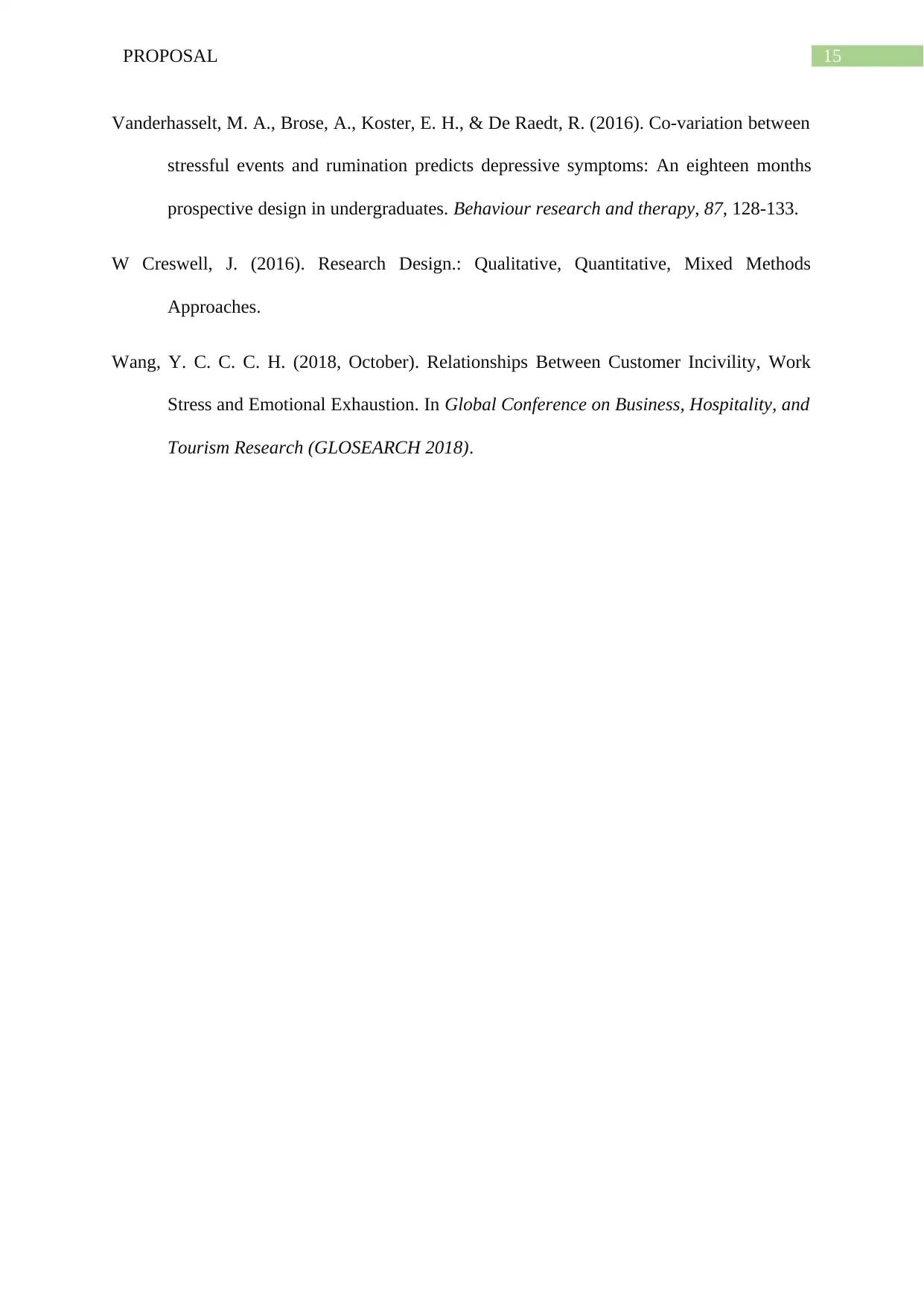
Vanderhasselt, M. A., Brose, A., Koster, E. H., & De Raedt, R. (2016). Co-variation between
stressful events and rumination predicts depressive symptoms: An eighteen months
prospective design in undergraduates. Behaviour research and therapy, 87, 128-133.
W Creswell, J. (2016). Research Design.: Qualitative, Quantitative, Mixed Methods
Approaches.
Wang, Y. C. C. C. H. (2018, October). Relationships Between Customer Incivility, Work
Stress and Emotional Exhaustion. In Global Conference on Business, Hospitality, and
Tourism Research (GLOSEARCH 2018).
Paraphrase This Document
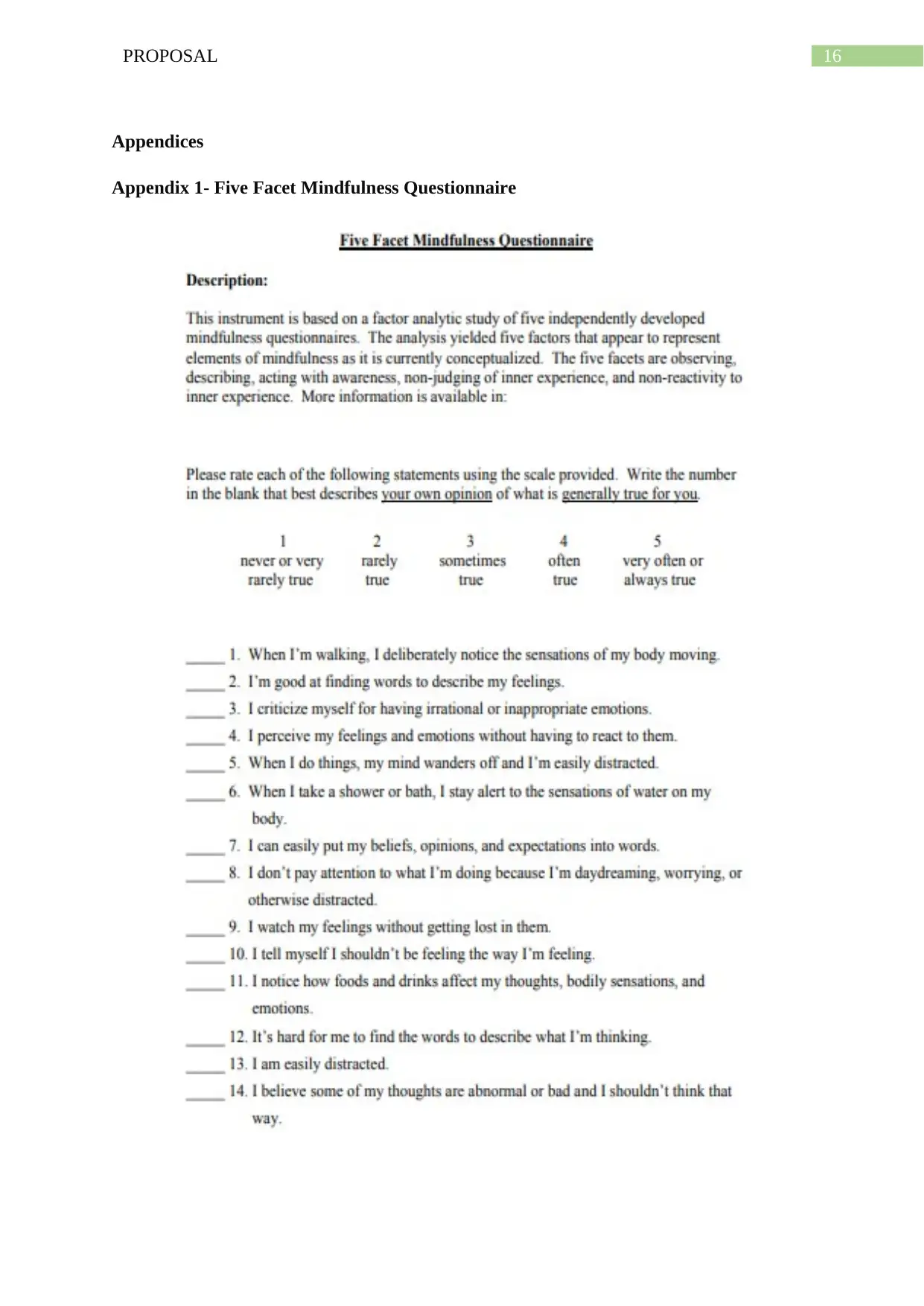
Appendices
Appendix 1- Five Facet Mindfulness Questionnaire
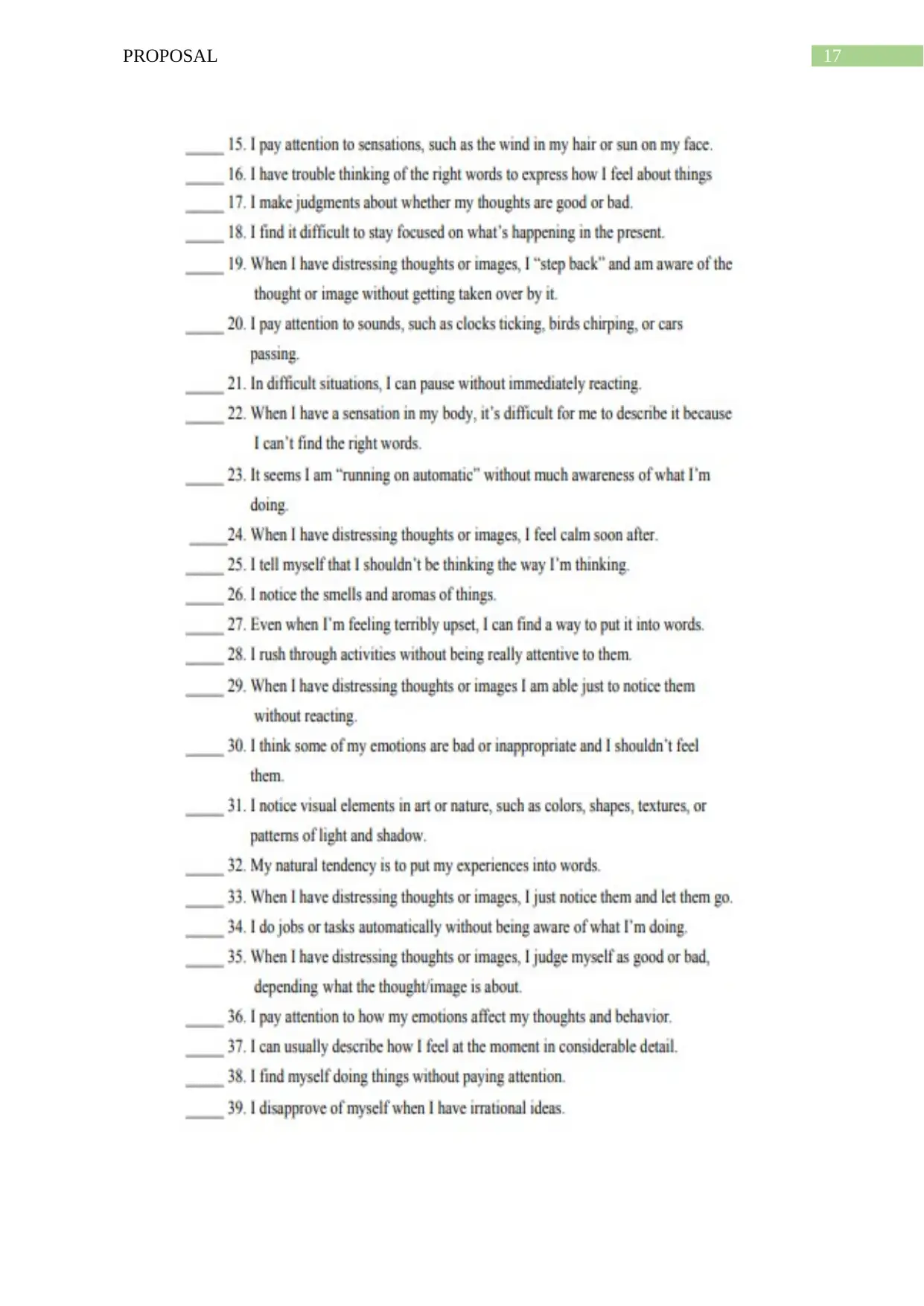
⊘ This is a preview!⊘
Do you want full access?
Subscribe today to unlock all pages.

Trusted by 1+ million students worldwide
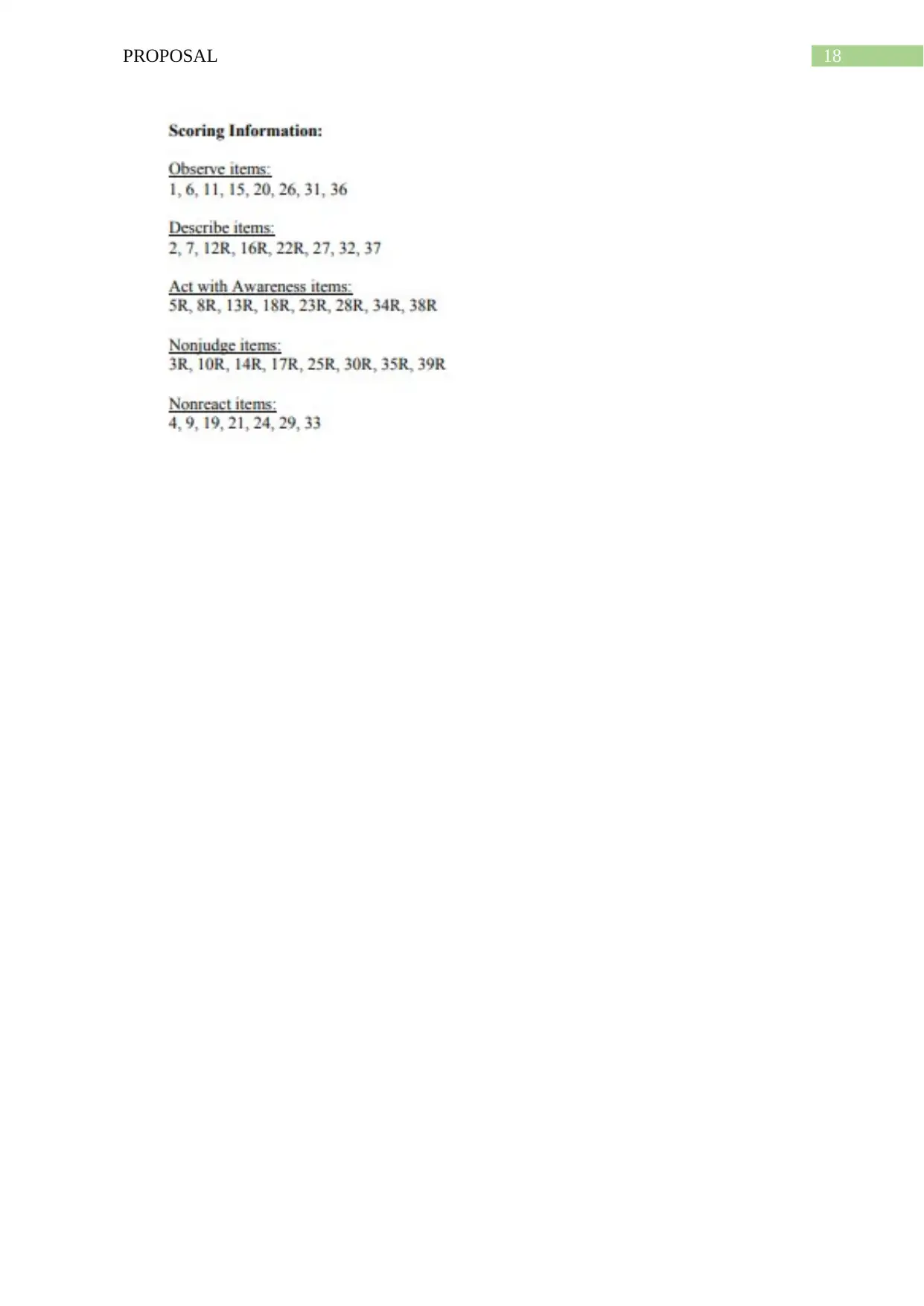
Paraphrase This Document
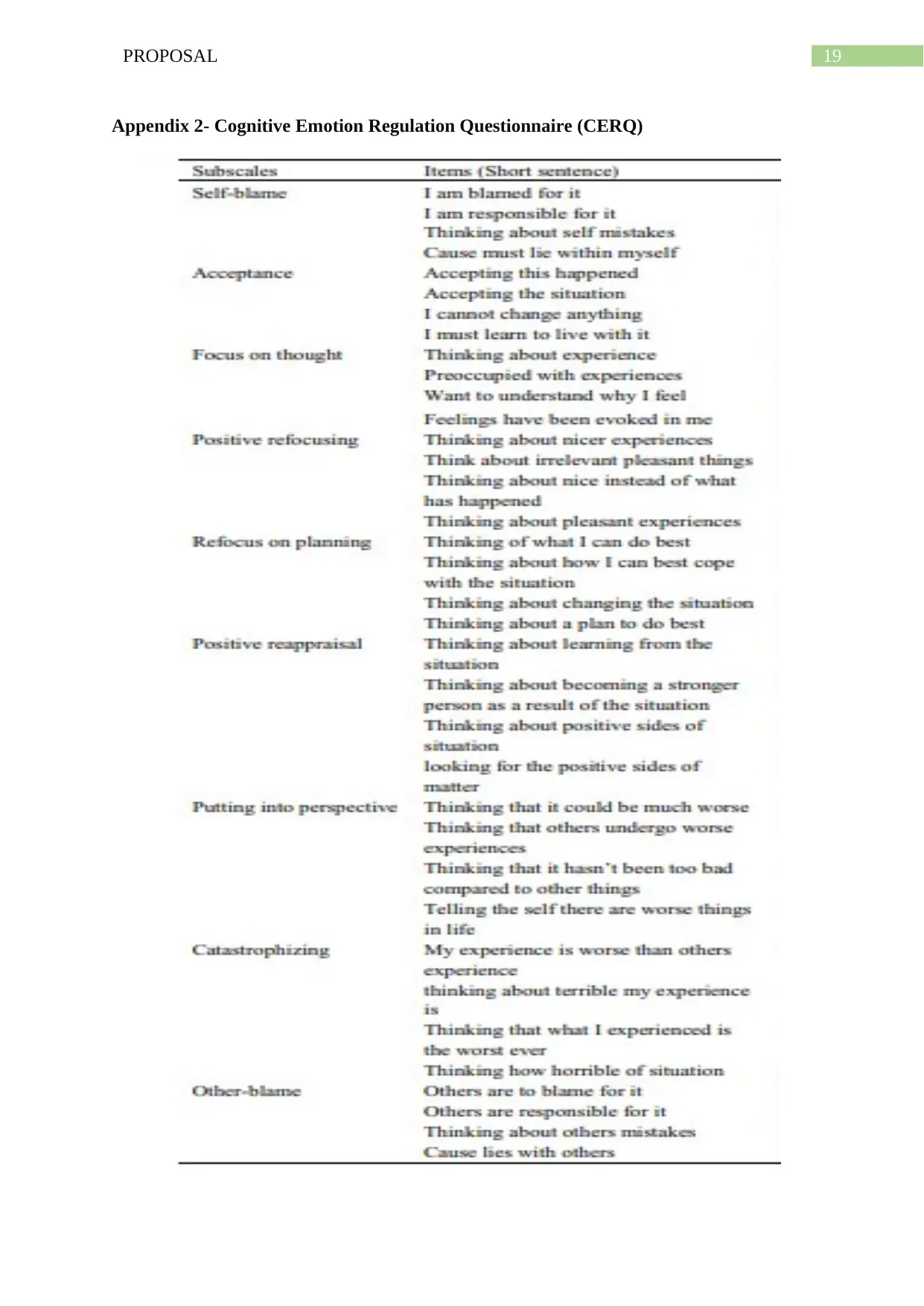
Appendix 2- Cognitive Emotion Regulation Questionnaire (CERQ)
Your All-in-One AI-Powered Toolkit for Academic Success.
+13062052269
info@desklib.com
Available 24*7 on WhatsApp / Email
![[object Object]](/_next/static/media/star-bottom.7253800d.svg)
© 2024 | Zucol Services PVT LTD | All rights reserved.